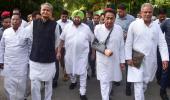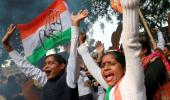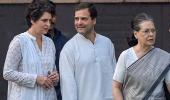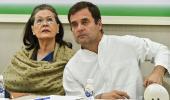'There is a need for a younger person at the top, but the old guard wants to grab the post themselves,' points out Amulya Ganguli.
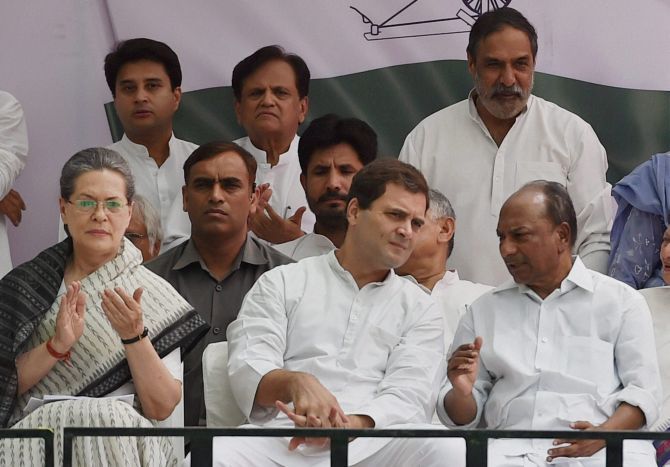
The Congress is not a stranger to crises.
Seeing the infighting between the moderates led by Gopal Krishna Gokhale and the 'extremists' led by Bal Gangadhar Tilak, the viceroy of India, Lord Curzon, had said the Congress is 'tottering to its fall'.
Not long after, the party split in 1907 because of the Gokhale-Tilak tussle.
The Congress split again in 1969 when Indira Gandhi ousted the old guard in the party known as the Syndicate, and yet again in 1978 when she tried to recover lost ground after the 1977 defeat.
But what is worth noting is that the Congress came through largely unscathed through these traumatic events.
It also survived the departures of tall leaders like Subhas Chandra Bose because of his differences with Mahatma Gandhi in 1939 and of Jayaprakash Narayan, J B Kripalani and others in the post-Independence period.
Given this track record of weathering bad times, it will be foolhardy to write the Congress's obituary because of its present difficulties.
However, there is a difference between what happened earlier and the present situation.
For one thing, the Congress earlier did not face as formidable an adversary as it is doing now at the Centre.
For another, even when the party was buffeted by ill winds in the past, it had at its helm leaders who had considerable popularity.
The party's present problems stem, therefore, from the fact that it is confronting a powerful party like the BJP which has established a solid base nearly all over the country under a charismatic leader, Narendra Damodardas Modi, who has succeeded in presenting himself as some kind of a messiah who can save the country from its external enemies like Pakistan and take it on a path of development.
In contrast, the Congress is bereft of both a popular leader and a coherent ideology.
For all of Rahul Gandhi's strenuous efforts as the party president to mobilise his forces and criticise the Modi dispensation, the Congress could win only 52 seats in the Lok Sabha, up by only eight from its previous lowest ever tally of 44.
Rahul may have done the right thing to take the responsibility for the debacle and resign.
But the precipitous step has plunged the Congress into a deeper crisis with droves of legislators in states like Karnataka, Telangana and Goa leaving the party for the greener pastures promised by the highly resourceful BJP.
The absence of a chief has forced former party president Sonia Gandhi to take a more active interest in the affairs of the organisation.
But her age -- she is 72 -- and indifferent health make it obvious that she is not the right person for saving the crumbling edifice.
There is a need for a younger person at the top, as has been suggested by Punjab Chief Minister Amarinder Singh.
But the search for Rahul's successor, as articulated by the outgoing president himself, has opened up further schisms in the traditionally fractious party between the aspirational young members like Rajasthan's Deputy Chief Minister Sachin Pilot and one of the 'big three' in Madhya Pradesh's Congress politics, Jyotiraditya Scindia, on one side, and the old guard on the other.
The trouble with the old guard is that like the Syndicate of the late 1960s, they can be compared with the 'power brokers', as Rajiv Gandhi did in 1985, who have converted a 'mass movement into a feudal oligarchy'.
It is the feudal servility of the 'power brokers' -- the Congress chief ministers, state unit presidents -- towards the high command comprising members of the Nehru-Gandhi dynasty which is preventing the selection of a young person as Rahul's successor since the old guard wants to grab the post themselves.
The suggestion by a senior Congressman, M Veerappa Moily, to hold organisational elections in order to choose a president has had few takers in the party as it has been used to for so long to abide by the dynasty's diktats that an exercise in internal democracy unnerves them.
Moreover, such is the ambience in which the Congress operates that even if the working committee chooses a successor, he or she will be seen as a puppet in the First Family's hands.
However, as the party flounders in the absence of a president, losing many of its MLAs to the BJP's open door policy, one school of thought argues that anti-incumbency can afflict the BJP for two reasons.
One is the continuing economic slowdown and the other is the organisational confusion which may be created in the BJP by the influx of so many outsiders who have no ideological moorings, but are driven solely by greed.
The Congress, therefore, can wait till the BJP is upstaged by its cynical poaching of the members of other parties and by the economic doldrums.
After all, there is no last word in politics.
Amulya Ganguli is a writer on current affairs.
